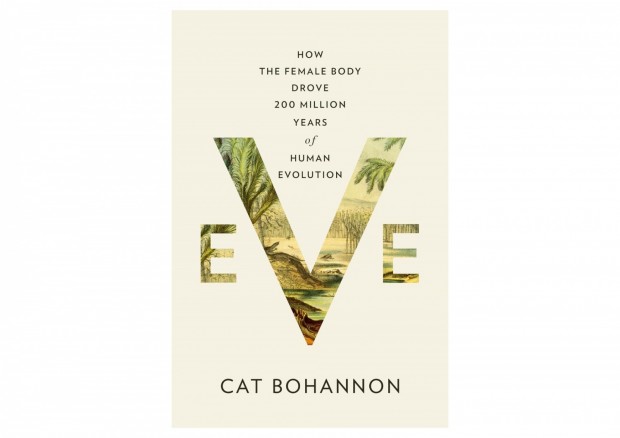Author Cat Bohannon Challenges Myths on Human Evolution With Book ‘Eve’

Cat Bohannon’s “Eve: How the Female Body Drove 200 Million Years of Human Evolution” challenges conventional myths on human evolution, urging a shift in focus from the evolution of man to the evolution of woman. (Photo : Amazon/Cat Bohannon)
Exploring the origins of humanity is an age-old fascination, and the upcoming book "Eve: How the Female Body Drove 200 Million Years of Human Evolution" adds a fresh perspective to this narrative. Speaking to Jeffrey Brown on PBS, Author Cat Bohannon shares her insights into the book. Bohannon takes us on a captivating journey, urging a re-evaluation of our past with profound implications for our present.
The book challenges the conventional focus on the evolution of man, proposing a shift to viewing it as the evolution of woman. Bohannon emphasizes the importance of including females in the storytelling of our evolutionary journey, a perspective often sidelined in traditional narratives.
Understanding Human Evolution With Eves
Bohannon introduces readers to a series of Eves, starting with the whimsically named Morgie, possibly the first-ever breast-feeder. Bohannon suggests that she has female features because ancient creatures started having those at a point in time. Through scientific data and personal anecdotes, she weaves a narrative that brings to life various Eves, each contributing to the story of human evolution in unique ways that continue to influence our present-day lives.
One of the book's highlights is the exploration of childbirth as a fundamental problem in human evolution. Bohannon sheds light on the challenges hominins and early humans face during childbirth, emphasizing the ingenious behavioral workarounds developed by our species to overcome the limitations of the human body.
The narrative extends back to Lucy, an Australopithecus afarensis, whose pelvis becomes a focal point in understanding the evolution of the human body. Bohannon delves into the pelvic narrowing and the obstetric dilemma, providing insights into how early humans coped with challenges in childbirth.
READ ALSO: Navigating Feminism: A Thoughtful Review of 'Diary of a Confused Feminist' by Kate Weston
Putting the Focus on Woman
Beyond the fascinating journey through evolution, Bohannon's book has broader implications for contemporary issues, particularly women's health. She cites the messiness of the hormonal cycle as one reason why women are taken out of the equation. She challenges the male-centric approach in biomedical research and emphasizes the need for a paradigm shift. The book prompts reflection on the male norm that has traditionally guided medical science, advocating for a better understanding of biological sex differences.
Bohannon draws attention to ongoing research on sex differences and their potential impact on areas like medicine, citing examples such as varied responses to opioids in men and women. The book calls for incorporating better knowledge about the female body into medical practices, considering our deep evolutionary history as a crucial factor in understanding human health.
In another interview on RadioWest, Bohannon argues that studies on biological science and medicine revolved around male bodies for decades. The author highlights that controlling the estrus and hormonal cycles is a possible reason why female bodies are rarely studied.
In conclusion, "Eve" transcends traditional narratives, offering readers a holistic and engaging exploration of human evolution from a female perspective. The book not only takes us through the ancient stories of Eves but also prompts us to rethink our approach to medicine and research in the present day.
RELATED ARTICLE: Jean Twenge's New Book Dives Into the Differences Between Generations
© 2023 Books & Review All rights reserved.
Popular Now
1
Books to Read After 'Fourth Wing': Top Picks for Fantasy and Romantasy Fans

2
‘The Secret Public’ by Jon Savage Book Review: An Insightful Look Into the LGBTQ Influence

3
Stephanie Regalado's 'If They Only Knew' Column Is Now A Book, Unleashing 60 Anonymous True Stories to Empower Women

4
'No Wire Hangers' Scene That Almost Did Not Happen: New Book Reveals Faye Dunaway's Struggles

5
Rare First Edition of Aphra Behn's Novel 'Oroonoko' Discovered in Kent: A Historic Literary Find

Latest Stories
Book Reviews
‘The Secret Public’ by Jon Savage Book Review: An Insightful Look Into the LGBTQ Influence

Book News
Stephanie Regalado's 'If They Only Knew' Column Is Now A Book, Unleashing 60 Anonymous True Stories to Empower Women

Book News
'No Wire Hangers' Scene That Almost Did Not Happen: New Book Reveals Faye Dunaway's Struggles

Book Reviews
‘The Perfect Couple’ by Elin Hilderbrand Book Review: A Captivating Summer Mystery

Book News
New Book ‘The Franchise’ Reveals Penguins President Kyle Dubas’ ‘Biggest Mistake’ as Maple Leafs GM










